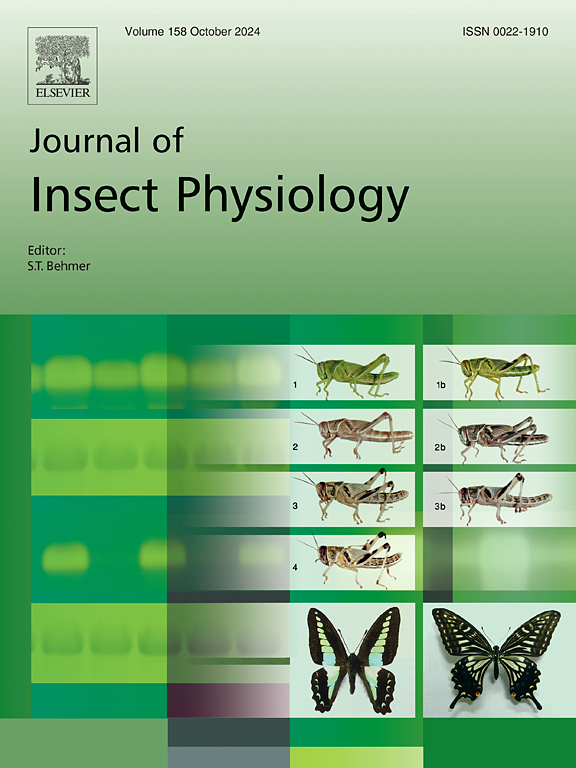5 -羟色胺对雄性日本黄黄蜂交配相关行为的激活作用
IF 2.3
2区 农林科学
Q1 ENTOMOLOGY
引用次数: 0
摘要
尽管雄性行为适应复杂社会环境的重要性,但社会性黄蜂的行为生理学却很少受到关注。为了探讨脑生物胺在雄性日本黄大黄蜂交配相关行为中的作用,我们首先确定了交配相关行为的发展和大脑生物胺的年龄相关变化。羽化后1周,雄性的运动、飞行和交配活动随日龄增加而增加。成虫羽化后1周内睾丸大小减小,表明雄性性成熟可能随着交配相关行为的发展而完成。大脑中的血清素水平随着年龄的增长而增加,与行为活动平行。大脑中的多巴胺水平在2天大时达到峰值,然后随着年龄的增长而下降,而大脑中的章鱼胺水平则随着年龄的增长而下降。因此,血清素是激活雄性交配相关行为的候选化合物。然后,我们通过注射血清素来检测血清素对雄性交配相关行为的影响。注射血清素可显著增强运动、飞行和交配活动,这取决于血清素的浓度。这些结果表明,血清素激活了雄性大黄蜂的交配相关行为。本文章由计算机程序翻译,如有差异,请以英文原文为准。

Activation of mating-related behavior by serotonin in males of the Japanese yellow hornet Vespa simillima
The behavioral physiology of males in social wasps has received little attention, despite the importance of male behavior adapted to complex social environments. To explore the roles of brain biogenic amines in mating-related behavior in male Japanese yellow hornets (Vespa simillima), we first determined the development of mating-related behavior and age-related changes to biogenic amines in the brain. The activities of locomotion, flight, and mating in the males increased with day-age by 1 week after emergence. Testes size decreased within 1 week after adult emergence, suggesting that male sexual maturation may be complete with the development of mating-related behavior. Serotonin levels in the brain increased with age in parallel to the behavioral activities. Dopamine levels in the brain peaked at 2 days of age and then decreased with age, whereas octopamine levels in the brain decreased with age. Thus, serotonin was a candidate compound activating mating-related behavior in males. We then examined the effects of serotonin on the mating-related behavior of males using serotonin injections. Injections of serotonin significantly enhanced activities of locomotion, flight, and mating, depending on serotonin concentration. Those results suggested that serotonin activates mating-related behavior in male hornets.
求助全文
通过发布文献求助,成功后即可免费获取论文全文。
去求助
来源期刊

Journal of insect physiology
生物-昆虫学
CiteScore
4.50
自引率
4.50%
发文量
77
审稿时长
57 days
期刊介绍:
All aspects of insect physiology are published in this journal which will also accept papers on the physiology of other arthropods, if the referees consider the work to be of general interest. The coverage includes endocrinology (in relation to moulting, reproduction and metabolism), pheromones, neurobiology (cellular, integrative and developmental), physiological pharmacology, nutrition (food selection, digestion and absorption), homeostasis, excretion, reproduction and behaviour. Papers covering functional genomics and molecular approaches to physiological problems will also be included. Communications on structure and applied entomology can be published if the subject matter has an explicit bearing on the physiology of arthropods. Review articles and novel method papers are also welcomed.
 求助内容:
求助内容: 应助结果提醒方式:
应助结果提醒方式:


